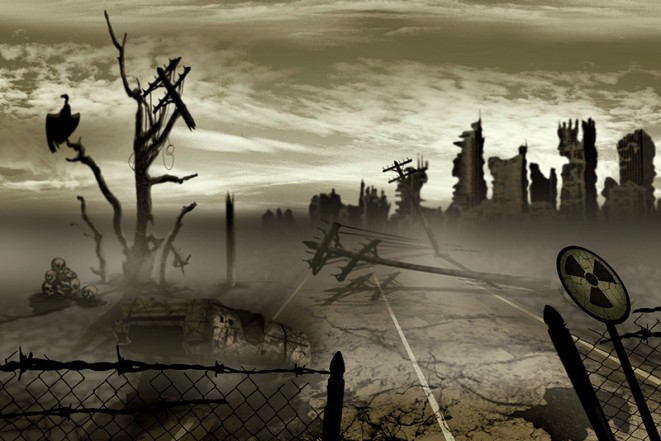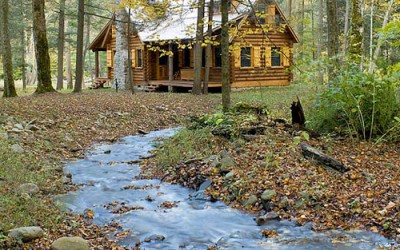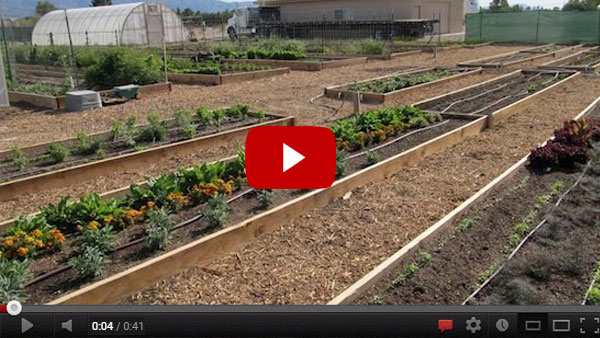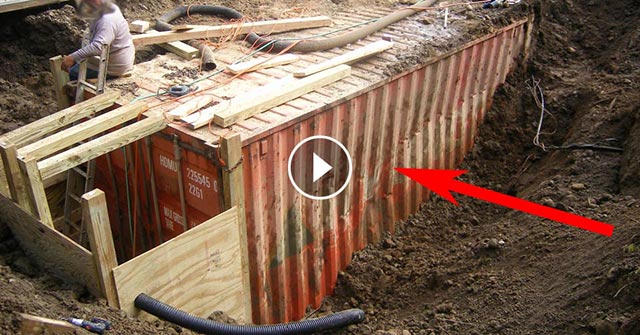Click Here To Join Our Telegram Channel for FREE daily tutorials!

If you’re serious about surviving (and even thriving) if the power grid goes down and society as we know it ends, then you likely know one of the most important criteria to success is a good location off the grid. Some of us, due to family or work, need to live in suburbs or near a large city. If that’s the case, there’s a lot of good information out there about forming a group of like-minded individuals to protect each other, and to provide for each other, in case of disaster.
Others have more flexibility in their life, and can choose from a broader range of options of where to live. Obviously, your location depends on how you plan to live off the grid. For example, a group of people planning to raise grass-fed cattle requires a different geography than someone who wants to live alone in a mountain cabin, and hunt and forage. This article focuses on a family that plans to live off the grid with a modest garden for food or a little space for small animals like chickens or rabbits, but otherwise doesn’t need a lot of space.
So for those who want to have a small homestead who are able to live where they want, keep in mind the following criteria when choosing a location.
1. Security
When the power grid fails, you want to be as far away as possible from large population centers. There are many reasons for this, but the primary one is that in the days and weeks after societal breakdown, there will be a lot of desperate and hungry people. After the stores have been looted and the weak robbed, they’ll branch out to nearby towns and farms.
Worse, as time goes on, many believe that the strong will form roaming bands of thugs, traveling around in armed convoys and stealing whatever they need.
A good rule of thumb is to be further away than a vehicle can travel on a full tank of gasoline. This means being 200 to 400 miles away from the big cities.
2. Water
Your homestead has to have a guaranteed supply of fresh water that is readily available. The best source is surface water, such as streams, rivers or lakes. At my homestead, I have a creek next to the house. While I have a pump that pulls water from the creek, and a filtration system to clean and disinfect the water, it relies on power. In a world without electricity, and if my off-the-grid power system has intermittent failures, I’ll revert to my stainless steel buckets to collect the water and fire to kill bacteria.
A lot of survivalists and preppers don’t have access to surface water, but have wells. The drawback is that in an unknown future, off-the-grid power sources may not last for more than a few years, and new pumps won’t be available. One option is to add a manual hand-pump to the well, so that you can draw water without power. There are kits available to do this, but they won’t be practical on the deepest wells.
3. Power

You also need to choose a location that complements your choice of power, whether it be a back-up to available electricity, or a true off-the-grid system. For example, if you plan on using solar power, then your homestead needs a location where the solar panels can get sunlight eight hours a day, and you need to be located in an area of the country that reliably gets sunshine most of the year.
If wind power is part of your power system, then consider a part of the country that regularly gets wind. North and South Dakota, Montana, and Texas are great states for wind power.
4. Food
The right location will complement your plan for food. If a serious, self-sustaining garden is a major part of your plan for food, then there a lot of factors to consider. The further north, or higher in elevation, you go, the shorter the growing season. It is true that great gardens are possible in the northern states, but on the flip side there are many parts of the country where you can grow three or four seasons a year. Another consideration is water. If your off-the-grid power system falters, even for a few days, getting sufficient water to a robust garden may not be feasible. So consider parts of the country that get plenty of rainfall all year, so that you can minimize or eliminate supplemental gardening. The homestead will also need a spot with fairly level ground, good soil, and eight hours of sunlight a day.
If your family hunts or fishes, then availability of wildlife is something to consider. Our nation’s lakes and streams are abundant with fish, and often waterfowl is nearby. In many parts of the country, deer roam the wilderness, along with smaller game like pheasants and rabbits. Keep in mind, however, that if food becomes scarce, a lot of city folks will be flooding nearby woods and lakes for game. That’s another reason why a healthy distance from population centers is important.
5. People Living Nearby
If you find a location far enough away from major population centers that fits your plan for water, power generation, and food, chances are there may be someone else living nearby. This can be a good thing or a bad thing.
It’s good if you can get to know them. Some of them may share your desire for self-sufficiency, albeit to a lesser degree. If that’s the case, then find out if you have skills or supplies that they might need in case of societal degeneration, and vice versa. Maybe they have livestock they’d be willing to trade for corn, potatoes and carrots from your garden. Or maybe they have skills or supplies they’d be willing to barter for your eggs or rabbit meat.
But be careful. The last thing you want is a group of people living nearby that is not prepared for an off-grid society, especially if they have guns and know that you have a five-year supply of freeze-dried food and a bountiful garden. While it’s crucial to get to know the people who live nearby so you can gauge if they’ll be helpful or harmful if society ends as we know it, go slow. One of the reasons I moved from my 40-acre, off-the-grid homestead was that the other 40-acre plots were mostly owned by people who had a lot of guns but no preparations intact for the future. If things got bad, I would be one of the first they would turn to. Kind of scary, actually.
The perfect off-the-grid location is dependent on you and how you plan to live now and in the future. Keep in mind the considerations discussed here when choosing that perfect location.
What tips and advice would you add? Share them in the section below:
By Malaya Careta
This Crazy Off Grid Device Literally Makes Drinkable Water From Fresh Air:
According to NASA, the U.S. is expecting a 100-YEAR LONG MEGADROUGHT.
It's already begun. Ask the farmers in California. They know.
Every survivalist knows that water is of critical importance. You NEED an independent water source that you can count on!
As an interesting "survival rehearsal" - imagine that you turned the tap on right now and nothing came out. How long would you last?
But what if there was another water source literally hidden in plain sight. That's right, I'm talking about the atmosphere!
The amazing thing about getting water from the natural moisture in the air... is that it is ALWAYS available.
This gives you real water security!
Learn more about how to tap into "Nature's secret water reservoir" and stay hydrated when TSHTF!
Watch the video:
😳 What Tinnitus Does To Your Brain Cells (And How To Stop It)
After 47 years of studies and countless brain scans done on more than 2,400 tinnitus patients, scientists at the MIT Institute found that in a shocking 96% of cases, tinnitus was actually shrinking their brain cells.
As it turns out, tinnitus and brain health are strongly linked.
Even more interesting: The reason why top army officials are not deaf after decades of hearing machine guns, bombs going off and helicopter noises…
Is because they are using something called "the wire method", a simple protocol inspired by a classified surgery on deaf people from the 1950s...

I Can't Help Showing This Off:
If you haven't heard of Claude Davis yet do yourself a huge favor and watch this video.
One of the smartest guys I ever had the pleasure of meeting, Claude set-up a unique prepping system that changed his life forever.
I already tried it myself and let me tell... you I was completely blown away... His surprising tactics could make your life easier and give you the peace of mind you deserve.
Don't just take my word for it... watch his short video and decide for yourself.

Most People Don't Have The Guts To Try This:
An amazing discovery in an abandoned house in Austin, Texas: A lost book of amazing survival knowledge, believed to have been long vanished to history, has been found in a dusty drawer in the house which belonged to a guy named Claude Davis.
Remember... back in those days, there was no electricity... no refrigerators... no law enforcement... and certainly no grocery store or supermarkets... Some of these exceptional skills are hundreds of years of old and they were learned the hard way by the early pioneers.
>> Click here to find out about them now
We've lost to history so much survival knowledge that we've become clueless compared to what our great grandfathers did or built on a daily basis to sustain their families.
Neighbors said that for the last couple of years Claude has tried to unearth and learn the forgotten ways of our great-grandparents and claimed to have found a secret of gargantuan proportions. A secret that he is about to reveal together with 3 old teachings that will change everything you think you know about preparedness:
>>> Click Here To Watch His Short Video <<<

More Off-Grid And Survival Resources:

What REALLY Happens When You Bury a Shipping Container? (Hint: It's A Bit Crazy...)
Shipping containers are all the rage - but if you are thinking about buying one, you MUST watch this video first:
There's a general belief that if you bury a shipping container you can create an awesome root cellar / storm shelter / survival bunker.
But is a shipping container strong enough to handle the pressure?
Watch the video to see what happens:
What Really Happens When You Bury a Shipping Container? (Click To Watch Video)









I would prefer, because of my age, to be like the walking stick and disguise my self to appear to be what i”am not. A survivor,to look like a run down house, with no means of food or drink.